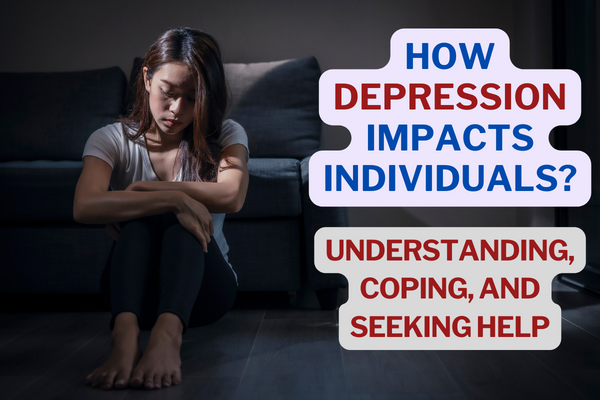How Depression Impacts Individuals: Understanding, Coping, and Seeking Help
Depression is a complex and multifaceted mental health condition that affects millions of individuals worldwide. It can manifest in various forms and can have a profound impact on all aspects of a person’s life, including their emotions, thoughts, behaviors, and physical health. In this comprehensive guide, we will delve deep into the intricacies of depression, exploring its causes, symptoms, effects, and most importantly, how individuals can cope with it and seek help when needed.
Understanding Depression
What is Depression?
Depression, also known as major depressive disorder, is a common and serious mood disorder characterized by persistent feelings of sadness, hopelessness, and a lack of interest or pleasure in activities. It goes beyond normal feelings of sadness or grief and can interfere with daily functioning.
Types of Depression
this can manifest in various forms, including:
- Major Depressive Disorder (MDD)
- Persistent Depressive Disorder (PDD)
- Bipolar Disorder
- Seasonal Affective Disorder (SAD)
- Postpartum Depression
- Psychotic Depression
Each type of depressions has its own unique features and symptoms, but they all share the common characteristic of causing significant distress and impairment in daily life.
Causes and Risk Factors in depression
Biological Factors
- Genetics: Family history of depression can increase the risk.
- Brain Chemistry: Imbalances in neurotransmitters like serotonin and dopamine can contribute to depressions.
- Hormonal Changes: Fluctuations in hormones, such as during puberty, pregnancy, or menopause, can trigger depression.
Environmental Factors
- Trauma or Stressful Life Events: Physical, emotional, or sexual abuse, loss of a loved one, or major life changes can precipitate depression.
- Chronic Illness: Living with a chronic medical condition can increase the risk of developing depressions.
- Substance Abuse: Alcohol or drug abuse can worsen or trigger depressions.
Symptoms of Depression
Emotional Symptoms
- Persistent sadness or emptiness
- Feelings of hopelessness or pessimism
- Irritability or frustration, even over small matters
Physical Symptoms
- Fatigue or lack of energy
- Changes in appetite or weight
- Insomnia or oversleeping
Cognitive Symptoms
- Difficulty concentrating, making decisions, or remembering things
- Negative thoughts or self-talk
- Thoughts of death or suicide
Behavioral Symptoms
- Loss of interest or pleasure in activities once enjoyed
- Social withdrawal or isolation
- Increased use of alcohol or drugs
Impact of Depression
Personal Life
Depression can significantly impact an individual’s personal life by:
- Straining relationships with family and friends
- Interfering with work or school performance
- Decreasing motivation and productivity
Physical Health
Depression is not just a mental health issue; it can also affect physical health by:
- Weakening the immune system
- Increasing the risk of chronic diseases like heart disease and diabetes
- Worsening existing medical conditions
Social Life
Depressions can lead to social withdrawal and isolation, making it difficult to:
- Maintain friendships and social connections
- Participate in social activities or events
- Seek support from others
Coping with Depression
Seeking Professional Help
- Therapy: Cognitive-behavioral therapy (CBT), interpersonal therapy (IPT), or medication can help manage symptoms.
- Support Groups: Joining a support group can provide a sense of community and understanding.
- Lifestyle Changes: Regular exercise, healthy diet, and sufficient sleep can improve mood and overall well-being.
Self-Care Strategies
- Practice Mindfulness: Mindfulness meditation or deep breathing exercises can help reduce stress and promote relaxation.
- Set Realistic Goals: Break tasks into smaller, manageable steps and celebrate achievements.
- Engage in Activities: Find activities that bring joy and fulfillment, whether it’s painting, gardening, or playing music.
Seeking Help
Recognizing the Signs
It’s essential to recognize the signs of depression in oneself or others, including:
- Persistent feelings of sadness or hopelessness
- Changes in appetite or sleep patterns
- Loss of interest in activities once enjoyed
Reaching Out
- Talk to Someone: Reach out to a trusted friend, family member, or mental health professional for support.
- Seek Professional Help: If symptoms persist or worsen, don’t hesitate to seek help from a therapist or psychiatrist.
- Utilize Resources: There are numerous helplines, online support groups, and mental health resources available for those struggling with depression.
Conclusion
Depressions is a challenging and often debilitating condition, but it’s essential to remember that help and support are available. By understanding the causes, symptoms, and effects of depressions, individuals can take proactive steps to cope with their symptoms and seek professional help when needed. With the right treatment and support, it is possible to manage depressions and lead a fulfilling life.
